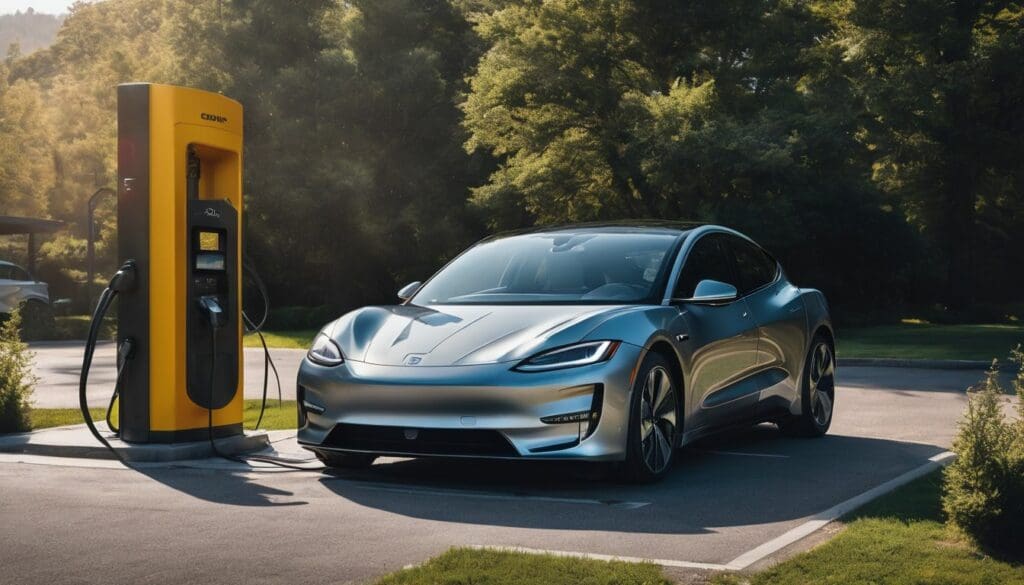Understanding the pressing need to maintain our vehicles in a manner that doesn’t jeopardise the Earth’s future can be quite overwhelming, can’t it? Rest assured, you’re not shouldering this burden alone – we’re all grappling with how to reconcile our dependency on cars with the need to reduce our environmental footprint.
It’s an open secret that traditional car maintenance has a rather hefty impact on pollution levels worldwide. But fear not! Our guide is brimming with eco-friendly tips and tricks that won’t just benefit your motor but will also do Mother Nature a solid favour.
So buckle up and prepare for a journey towards sustainability, driving your beloved car in harmony with our precious environment.
Key Takeaways
- Traditional vehicle maintenance contributes significantly to environmental issues such as greenhouse gas emissions, hazardous waste disposal, noise pollution, and habitat destruction.
- Adopting eco – friendly maintenance practices like using biodegradable products, electric vehicles, and efficient routing can help reduce the ecological impact of our transportation habits.
- Transitioning to alternative fuels and electric vehicles not only lowers carbon emissions but also brings financial benefits due to reduced fuel and maintenance costs.
- Proactive vehicle maintenance and educating drivers on eco – driving techniques are essential for promoting longer vehicle life spans and more sustainable driving behaviours.
- Sustainable fleet management includes strategies such as right-sizing fleets, promoting electric vehicle use, implementing green procurement policies, and continuous driver training in eco-conscious practices.
The Impact of Traditional Vehicle Maintenance on the Environment
Traditional vehicle maintenance practices have significant environmental impacts, including greenhouse gas emissions, hazardous waste disposal, resource consumption, noise pollution, and land use/habitat destruction.
These factors contribute to the overall carbon footprint of transportation systems and have far-reaching consequences for our planet.
Greenhouse gas emissions
Every time we maintain our vehicles the old-fashioned way, we’re giving a green light for greenhouse gases to choke up our atmosphere. These emissions come from burning fuel and can also seep out during improper servicing.
It’s not just about what comes out of exhaust pipes; refrigerants leaking from air conditioning systems add potent climate-warming chemicals into the mix.
We recognise the urgent need to cut these harmful emissions by adopting eco-friendly vehicle maintenance practices. By turning to energy-efficient car care and sustainable vehicle upkeep, we actively reduce our carbon footprint.
This move is crucial in steering towards a greener future where clean air isn’t a luxury but a given for all of us.
Hazardous waste disposal
When handling hazardous waste disposal, it is crucial to comply with regulations and take necessary precautions. Proper handling and disposal of oils, solvents, batteries, and other hazardous materials prevent environmental contamination.
Implementing eco-friendly practices like recycling used oil and properly disposing of old batteries minimises the impact on the environment.
Ensuring that all staff are well-trained in identifying and managing hazardous waste is vital for a sustainable vehicle maintenance programme. By implementing safe disposal methods and promoting responsible waste management, we can reduce harm to the environment while contributing to a greener future.
Resource consumption
Reducing resource consumption in vehicle maintenance is essential for protecting the environment. By using sustainable products and materials, we can minimise the depletion of natural resources while maintaining our vehicles.
Implementing preventative maintenance strategies can also help reduce the overall energy and material consumption required for repairs and replacements.
Efficient routing not only saves fuel but also reduces the wear and tear on vehicles, thus minimising resource usage. Driver education on eco-friendly driving habits can further contribute to reduced fuel consumption, ultimately lessening our reliance on non-renewable resources.
Noise pollution
Noise pollution from traditional vehicle maintenance contributes to environmental degradation and impacts ecosystems. Loud engine noises, exhaust systems, and constant vehicle movement can disturb wildlife, disrupt natural habitats, and lead to increased stress levels in animals.
Implementing sustainable practices such as using electric vehicles or maintaining engines regularly with eco-friendly materials can reduce noise pollution significantly. Employing efficient routing techniques helps minimise unnecessary transportation noise, benefiting both local communities and the environment.
Transitioning to energy-efficient vehicle servicing is key for minimising noise pollution.
By adopting environmentally friendly vehicle maintenance practices that focus on reducing noise pollution, we are actively contributing to a healthier environment. Educating drivers in eco-driving techniques also plays a vital role in diminishing excessive vehicular sounds and promoting quieter green fleet management strategies.
Land use and habitat destruction
We can see that traditional vehicle maintenance has led to significant land use and habitat destruction. The expansion of roads and infrastructure results in the fragmentation of habitats, impacting wildlife migration patterns and leading to loss of biodiversity.
Additionally, the extraction of raw materials for vehicle production leads to deforestation and degradation of ecosystems. As environmentally conscious individuals, it is crucial for us to support sustainable auto care practices that minimise these impacts on our environment.
Implementing green fleet maintenance strategies such as transitioning to electric vehicles or right-sizing the fleet can help reduce land use for road construction and decrease habitat destruction.
Shift Towards Eco-Friendly Maintenance
The shift towards eco-friendly maintenance is a growing trend within the automotive industry. This includes the use of alternative fuels, sustainable products and materials, implementing preventative maintenance, efficient routing, and driver education.
Trend of using alternative fuels
Many vehicle owners are now choosing alternative fuels over traditional gasoline and diesel, reducing their carbon footprint. The use of biofuels, such as ethanol and biodiesel, is gaining popularity due to their renewable nature and lower emissions.
Additionally, the adoption of electric vehicles is on the rise, offering a cleaner and more sustainable option for environmentally conscious individuals. These alternatives not only help in reducing greenhouse gas emissions but also contribute to promoting a greener future for our planet.
As the trend towards using alternative fuels continues to grow, it’s important to explore other eco-friendly maintenance practices that further benefit both the environment and cost savings.
Use of sustainable products and materials
To support eco-friendly vehicle maintenance, we prioritise the use of sustainable products and materials. By opting for biodegradable cleaning agents, recycled motor oil, and energy-efficient tyres, we can significantly reduce our environmental impact.
Implementing these choices not only minimises our carbon footprint but also promotes a greener future for all.
Our commitment to using sustainable products and materials aligns with our goal to make environmentally conscious decisions in every aspect of vehicle maintenance. Choosing eco-friendly options like plant-based lubricants and renewable car parts contributes to reducing resource consumption and promoting sustainable practices within the automotive industry.
Implementing preventative maintenance
To reduce environmental impact and promote sustainable vehicle maintenance, we implement preventative maintenance through the following strategies:
- Regular inspections of vehicle systems and components to identify potential issues before they become major problems, thereby reducing the need for extensive repairs and replacement parts.
- Scheduling routine oil changes, filter replacements, and fluid checks to ensure optimal performance and fuel efficiency, whilst also preventing leaks and emissions of harmful substances.
- Conducting tyre rotation and pressure checks to extend tyre life, improve fuel economy, and minimise rubber waste in landfills.
- Utilising eco – friendly cleaning products for vehicle interiors and exteriors to reduce the use of harsh chemicals that can contaminate water sources.
Efficient routing
To reduce fuel consumption and emissions, plan the most direct and efficient routes.
- Utilise digital map services: These tools will help us plot out the most fuel-efficient and eco-friendly routes by avoiding heavy traffic areas and selecting roads with lower environmental impact.
- Optimise delivery schedules: By grouping deliveries based on location and optimising the order of stops, we can minimise mileage, reduce fuel consumption, and lower overall emissions.
- Promote eco-friendly driving habits: Encourage drivers to take the most direct routes, avoiding idling, unnecessary acceleration, and sudden braking to save fuel and reduce emissions.
- Consider alternative transportation modes: When possible, utilise greener transportation options such as cycling or walking for short-distance trips to further reduce carbon footprint.
- Promote collaborative logistics: Coordinating with other businesses or entities for shared transportation resources can lead to more efficient routing and reduced environmental impact through combined efforts.
Driver education
Driver education plays a pivotal role in transitioning to eco-friendly vehicle maintenance. By instructing drivers in eco-driving techniques, we can promote fuel-efficient driving habits that reduce carbon emissions and lessen the environmental impact of our vehicles.
Training drivers on how to implement efficient routing and maintain proper tire pressure not only reduces fuel consumption but also contributes to cost savings and improved air quality.
Educating drivers about the benefits of preventative maintenance can help extend the lifespan of vehicles, promoting a more sustainable approach to transportation.
Implementing driver education programmes is essential for fostering an eco-conscious fleet management culture. The knowledge gained through these programmes empowers drivers to make environmentally friendly choices while operating their vehicles, ultimately contributing to a greener future.
Advantages of Energy-Efficient Vehicle Maintenance
Reduced carbon footprint and improved air quality are just some of the benefits of energy-efficient vehicle maintenance. By promoting a greener future, eco-friendly car care also leads to cost savings and increased efficiency.
Reduced carbon footprint
Switching to eco-friendly vehicle maintenance significantly reduces our carbon footprint. By using alternative fuels and implementing efficient routing, we can lower greenhouse gas emissions from our vehicles.
Similarly, transitioning to electric vehicles and right-sizing the fleet are effective strategies in reducing our overall carbon emissions. Embracing energy-efficient vehicle servicing not only minimises our environmental impact but also promotes a greener future.
These changes lead to improved air quality, cost savings, and increased efficiency for sustainable transportation upkeep.
Cost savings
Switching to energy-efficient vehicle maintenance leads to significant cost savings. By using alternative fuels and sustainable products, the expenses associated with traditional maintenance are reduced.
Efficient routing and preventative maintenance also contribute to lower operating costs for environmentally friendly vehicle servicing. Transitioning to electric vehicles can result in long-term financial benefits through decreased fuel and maintenance expenditures, making eco-friendly fleet management a financially wise choice.
Choosing eco-conscious vehicle maintenance not only supports environmental sustainability but also provides tangible economic advantages. Sustainable practices lead to reduced carbon emissions, improved air quality, and increased efficiency at lower costs, contributing towards a greener future while ensuring financial prudence.
Improved air quality
Switching to eco-friendly vehicle maintenance can lead to improved air quality. By reducing emissions and using alternative fuels, we can minimise the release of pollutants into the atmosphere.
Driving electric vehicles and implementing energy-efficient practices also contribute positively to cleaner air. These efforts support a healthier environment for our communities while promoting sustainable transportation solutions.
Furthermore, embracing eco-conscious car care and green automotive repair not only benefits the planet but also improves public health by reducing harmful emissions in our immediate surroundings.
Increased efficiency
Making the switch to eco-friendly vehicle maintenance not only improves air quality but also increases efficiency. By integrating sustainable products, materials, and driving techniques, we can significantly reduce our carbon footprint while enhancing the overall performance of our vehicles.
Implementing preventative maintenance and efficient routing not only helps in reducing resource consumption but also leads to cost savings and promotes a greener future.
Proactive vehicle maintenance is crucial in ensuring that our cars are operating at their optimal level. Training drivers in eco-driving techniques further enhances energy-efficient car care while transitioning to electric vehicles offers a more sustainable approach towards transportation.
Promoting a greener future
By transitioning to energy-efficient vehicle maintenance, we are actively promoting a greener future. Embracing eco-conscious car care and sustainable fleet management not only reduces our carbon footprint but also significantly contributes to improved air quality and cost savings.
Implementing green and electric vehicle maintenance, along with sustainable procurement policies, supports the conservation of our environment while ensuring the longevity of our planet for generations to come.
Our commitment to environmentally friendly auto maintenance and earth-friendly vehicle servicing directly impacts climate change positively. It is imperative that we continue adopting eco-conscious practices, such as alternative fuel vehicle servicing and proactive fleet management, to reinforce our dedication to a sustainable future.
Strategies for Sustainable Fleet Management
Training drivers in eco-driving techniques and implementing proactive vehicle maintenance are key strategies for sustainable fleet management. Transitioning to electric vehicles, right-sizing the fleet, and implementing green procurement policies are also important steps towards creating an eco-friendly vehicle maintenance programme.
Training drivers in eco-driving techniques
To minimise fuel consumption and reduce carbon emissions, drivers can benefit from training in eco-driving techniques. By adopting these practices, they can contribute to a greener future. Here are some strategies that environmentally conscious individuals can consider for training drivers in eco-driving techniques:
- Utilising smooth acceleration and braking to reduce fuel consumption and vehicle wear.
- Maintaining a steady speed to optimise fuel efficiency without compromising safety.
- Anticipating traffic flow and using routes with less congestion to minimise fuel usage.
- Properly maintaining vehicles to ensure optimal performance and fuel efficiency.
- Ensuring tyres are properly inflated to reduce rolling resistance and improve fuel economy.
- Minimising idling time by turning off the engine when the vehicle is stationary for an extended period.
- Educating drivers about the benefits of eco – driving on both environmental impact and cost savings.
Proactive vehicle maintenance
- Schedule routine inspections for all vehicle components to detect and repair any faults early.
- Utilise eco-friendly products for cleaning, lubrication, and fluid top-ups to reduce environmental impact.
- Monitor and maintain tyre pressure to improve fuel efficiency and reduce emissions.
- Adopt a preventive maintenance schedule for oil changes, filter replacements, and fluid checks.
- Implement regular engine tuning to optimise performance and minimise emissions.
- Keep track of vehicle usage patterns to anticipate maintenance needs and ensure timely servicing.
Transitioning to electric vehicles
Transitioning to electric vehicles offers a sustainable solution to reduce greenhouse gas emissions and promote eco-friendly transportation. Electric vehicles are powered by rechargeable batteries, eliminating the need for petrol or diesel fuel combustion, which significantly reduces air pollution. Furthermore, utilising electric vehicles supports the conservation of natural resources and minimises noise pollution.
- Lower carbon emissions: Electric vehicles produce zero tailpipe emissions, reducing the overall carbon footprint and contributing to cleaner air quality.
- Cost savings: Electric vehicles have lower operating costs as they require less maintenance and no fuel expenses, resulting in long-term financial benefits.
- Enhanced energy efficiency: Electric vehicles convert a higher percentage of the stored energy from the grid to power at the wheels compared to internal combustion engines, making them more efficient.
- Promoting a greener future: Embracing electric vehicles as part of sustainable fleet management initiatives aligns with environmental conservation efforts while supporting a transition towards eco-conscious transportation practices.
- Infrastructure development: Encouraging the establishment of convenient charging stations and investing in renewable energy sources can further facilitate the widespread adoption of electric vehicles.
Right-sizing the fleet
Managing a fleet that is the right size is crucial for reducing environmental impact. We ensure that we have only as many vehicles as needed, avoiding unnecessary fuel consumption and emissions.
By carefully analysing our operational needs, we can optimise routes and improve efficiency, minimising our carbon footprint.
By constantly assessing demand and usage patterns, we make informed decisions about the number of vehicles required to serve our purposes effectively. This helps us reduce energy usage while meeting all necessary transportation needs appropriately.
Implementing green procurement policies
- Prioritise purchasing from suppliers who offer eco – friendly products and materials, such as recycled parts and renewable resources. This reduces the environmental footprint of our vehicle maintenance practices.
- Consider the lifecycle impact of products before making procurement decisions. Assess factors such as energy consumption, emissions, and environmental impact during production, use, and disposal.
- Incorporate criteria for sustainability into our procurement process, evaluating not just cost but also environmental performance when selecting vendors and suppliers.
- Encourage innovative solutions through collaboration with suppliers to develop new environmentally friendly products tailored to our specific maintenance needs.
- Regularly review and update our procurement policies to ensure they align with evolving best practices in sustainable resource management.
Conclusion
In conclusion, embracing eco-friendly vehicle maintenance has become essential for supporting environmental conservation. Shifting to energy-efficient car care not only reduces our carbon footprint but also leads to cost savings and improved air quality.
By implementing sustainable fleet maintenance practices, we can contribute to a greener future and make a positive impact on the planet. It’s time for all of us to take proactive steps towards eco-conscious vehicle management.
FAQs
1. What does eco-friendly vehicle maintenance mean?
Eco-friendly vehicle maintenance involves taking care of cars and fleets using methods that are kind to the environment, such as eco-conscious car care and energy-efficient servicing techniques.
2. Why should I consider eco-conscious fleet management?
Considering eco-conscious fleet management helps reduce your carbon footprint, supports climate-friendly transportation, and often leads to cost savings on energy usage over time.
3. Can regular car repairs be environmentally friendly too?
Yes, environmentally conscious car repairs focus on using sustainable methods and materials that cause less harm to the Earth while maintaining your vehicle’s performance.
4. Are there benefits to switching my fleet to green vehicle maintenance practices?
Switching your fleet to green vehicle maintenance practices saves energy, cuts down emissions for a cleaner planet, and can improve public perception of your business as earth-friendly.
5. How do I start with eco-conscious vehicle maintenance for my car or fleet?
To start with eco-conscious vehicle maintenance, seek out garages that specialise in sustainable servicing techniques and opt for green automotive upkeep solutions for long-term efficiency.





